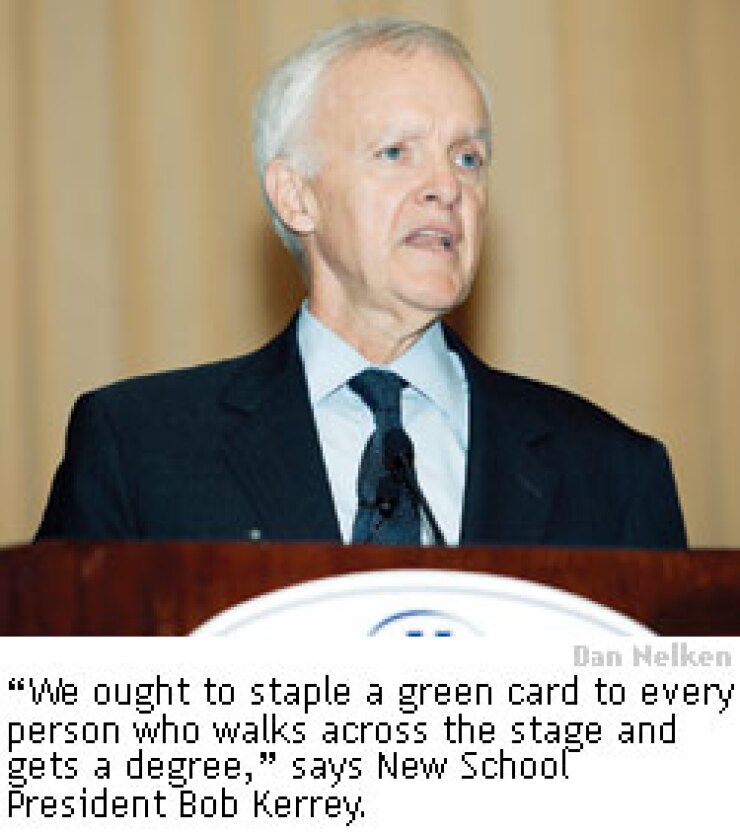
Universities and colleges need to think about how to attract and serve students in a global environment, New School University president Bob Kerrey said Tuesday.
“Our students are global today — they’re very tech-savvy — but they’re global,” Kerrey said during the keynote address for the second day of The Bond Buyer 501(c)3 Super Conference in New York City. “They’re thinking globally and we have to extend our campuses accordingly.”
Not only do 25% of the 10,000 students at the New School come from abroad, but domestic students want to go someplace else for part of their studies, he said. Though the university doesn’t have satellite campuses in other countries, it does have study abroad programs.
“That is definitely a trend that we’re seeing — more global outreach by American universities,” said Standard & Poor’s analyst Mary Peloquin-Dodd. “We suspect it will continue over time.”
Kerrey — who was governor of Nebraska and a U.S. senator before taking the head position at the New School in 2001 — criticized U.S. immigration policy that he said makes it difficult for international students to work while in school and to stay after graduation.
“We ought to staple a green card to every person who walks across the stage and gets a degree — at least in those fields that we know will add to productivity and increase GDP and add a lot in other ways to society,” Kerrey said.
The decentralized American higher education system has competitive advantages compared to other countries, including the generosity of donors and the fact that the curriculum is left up to the institutions, he said.
Though higher education institutions compete with each other for donors, students, and faculty, they could also benefit from more competition if the accreditation regulatory system were changed, according to Kerrey.
He said the regulatory process for a college to become accredited takes seven to 10 years, which serves as a kind of protection from the marketplace for institutions and are part of what is driving up the cost of higher education.
A faster though not necessarily easier system would add more competition and increase quality, he said.
“It would make us more competitive,” Kerrey said. “It would make us really focus on quality if we had some new entrants that were highly competitive.”
The New School, which is ranked 139th in the nation among top-tier universities by U.S. News & World Report, plans to go to market with bonds in about two months.
It plans to use the proceeds to finance the construction of a university center and a 608-bed dormitory at 65 Fifth Ave. in Manhattan and to renovate three floors of a nearby leased building.
In July, the Dormitory Authority of the State of New York gave preliminary approval to issue up to $350 million of bonds on behalf of the school.
The expansion comes as New York University and Columbia University are also planning major expansions.
“We’re a different kind of university than they are, but we are trying to keep up with them in terms of capacity to give our students what they want — more indoor space, more recreational facilities, more study space,” Kerrey said.
An institution’s quality of education has an impact on its bond rating, he noted.
“The capacity of a university to operate efficiently and to have good finances indicates that they’re doing a good job on the academic side,” Kerrey said following the speech. “Otherwise, you’re constantly robbing the academic side of the university in order to make your numbers.”
If “the bond-rating guy said you’re in good financial condition, it’s highly likely you’re going to be in good academic shape as well,” he said.
Peloquin-Dodd said that while that observation was generally true, there are exceptions, though institutions that have temporary weaker financial performance can still produce a good academic product.
“Quality and the ability to operate financially are sort of intertwined,” she said. “If you have a good product people are willing to pay for it.”
Kerrey will be stepping down as president of the university at the end of the year.
He will be replaced by Northwestern University School of Law dean and professor of law David Van Zandt.





